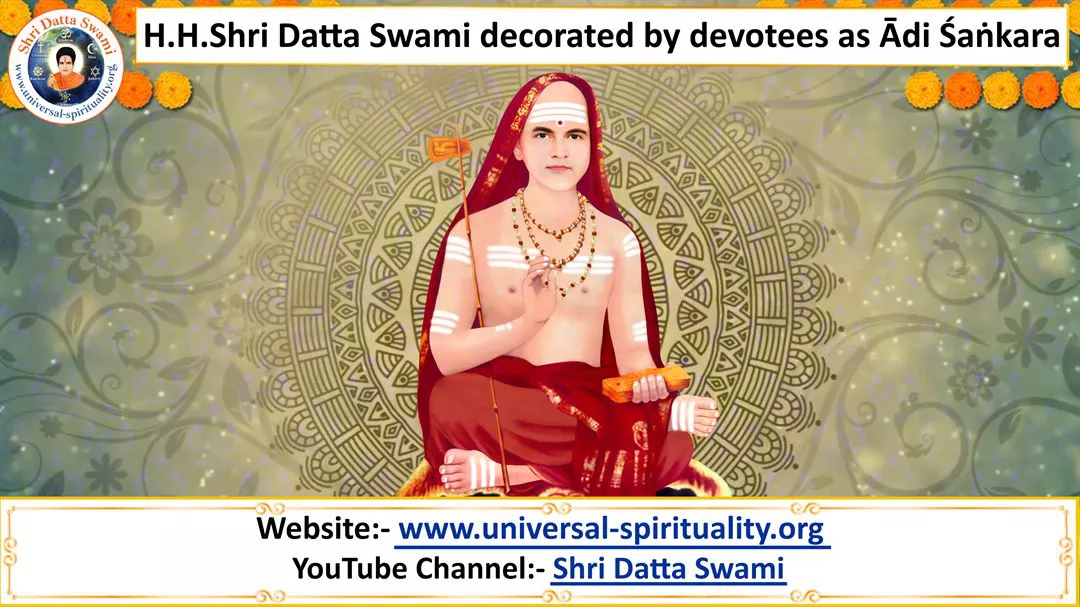
07 Feb 2025
[Prof. JSR Prasad asked:- Sāṣṭāṅga namaskāraṃ Swami. Shankara wrote in a prayer “Kaupīnavantaḥ khalu bhāgyavantah” that the great soul is wandering saying that it is God or Brahman (Brahmāhamasmīti vibhāvayantaḥ). Does this not mean that Shankara agreed every soul is God?
--At Your divine holy lotus feet]
Swami replied:- The monism told by Shankara applies to human incarnation, which can say that it is Brahman or God. In this way, the monism of Shankara in the case of human incarnation is perfectly correct. In the case of a climax devotee, God may treat such devotee as His own part or limb like eye or hand. A special devotee like Adishesha becomes a true example for this concept of special monism of Ramanuja. Here, God is the whole (Śeṣī) and Adishesha is a very dear part (Śeṣa) like eye or hand. Hence, the concept of Ramanuja is correct in the case of a climax devotee. In the case of an ordinary soul trying to become a climax devotee, the dualism of Madhva becomes correct because, here, God becomes the master and the devotee becomes servant as we see in the case of God Rama and Hanuman.
You may object that how Shankara told that even every ordinary soul is Brahman. There is nothing wrong in such statement because Brahman means not only God but also any item greatest in a specific category of items. The word ‘Brahman’ is derived from the root ‘Bṛhi’, which means greatest (Bṛhi – vṛddhau). In any specific category, the greatest item can be called as Brahman. For example, in the category of scriptures, the Veda is the greatest and is called as Brahman (Brahmākṣara samudbhavam – Gita). The individual soul or Jīva or the awareness as bundle of thoughts is the greatest item in the category of worldly items created by God. This point is clearly told by the Gita. Prakṛti means the world or all the items of the world. Parā Prakṛti means the greatest of all worldly items. The individual soul or Jīva is called as Parā Prakṛti by the Gita (Prakṛtiṃ viddhi me parām, Jīvabhūtāṃ mahābāho… – Gita).

We have told already that any greatest item in a specified category of items can be called as Brahman. Food, oxygen, mind, intelligence, bliss, the Veda etc., are called as Brahman in the Veda due to their supremacy in corresponding specific items. When a soul says that it is Brahman, it does not mean that it is God. It only means that it is the greatest among the created items (Parā Prakṛti). Therefore, when Shankara told that ordinary souls are speaking themselves as Brahman in the above said prayer, there is no contradiction to the true spiritual knowledge established by Shankara. The sense of this statement said in the Veda is also the same as said above. If the human incarnation is taken, in this statement Brahman means God. If an ordinary soul is taken, Brahman means the greatest item among all the created items by God. Shankara told that a specific soul is God or Brahman and did not say that all souls or each soul is Brahman or God. He told that a specific soul is God (Jīvo Brahmaiva nāparaḥ). Here, ‘Jīvaḥ’ is in singular number, which means a single soul. This word cannot be replaced by ‘Jīvāḥ’, which is in plural number or all souls.
★ ★ ★ ★ ★